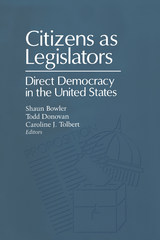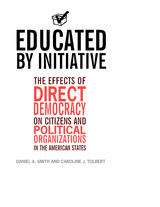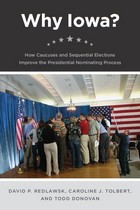

--Kristina Wilfore, Executive Director, Ballot Initiative Strategy Center and Foundation
Educated by Initiative moves beyond previous evaluations of public policy to emphasize the educational importance of the initiative process itself. Since a majority of ballots ultimately fail or get overturned by the courts, Smith and Tolbert suggest that the educational consequences of initiative voting may be more important than the outcomes of the ballots themselves. The result is a fascinating and thoroughly-researched book about how direct democracy teaches citizens about politics, voting, civic engagement and the influence of special interests and political parties. Designed to be accessible to anyone interested in the future of American democracy, the book includes boxes (titled "What Matters") that succinctly summarize the authors' data into easily readable analyses.
Daniel A. Smith is Associate Professor of Political Science at the University of Florida.
Caroline J. Tolbert is Associate Professor of Political Science at Kent State University.

That there is a "digital divide"—which falls between those who have and can afford the latest in technological tools and those who have neither in our society—is indisputable. Virtual Inequality redefines the issue as it explores the cascades of that divide, which involve access, skill, political participation, as well as the obvious economics. Computer and Internet access are insufficient without the skill to use the technology, and economic opportunity and political participation provide primary justification for realizing that this inequality is a public problem and not simply a matter of private misfortune.
Defying those who say the divide is growing smaller, this volume, based on a unique national survey that includes data from over 1800 respondents in low-income communities, shows otherwise. In addition to demonstrating why disparities persist in such areas as technological abilities, the survey also shows that the digitally disadvantaged often share many of the same beliefs as their more privileged counterparts. African-Americans, for instance, are even more positive in their attitudes toward technology than whites are in many respects, contrary to conventional wisdom. The rigorous research on which the conclusions are based is presented accessibly and in an easy-to-follow manner.
Not content with analysis alone, nor the untangling of the complexities of policymaking, Virtual Inequality views the digital divide compassionately in its human dimensions and recommends a set of practical and common-sense policy strategies. Inequality, even in a virtual form this book reminds us, is unacceptable and a situation that society is compelled to address.

If Barack Obama had not won in Iowa, most commentators believe that he would not have been able to go on to capture the Democratic nomination for president. Why Iowa? offers the definitive account of those early weeks of the campaign season: from how the Iowa caucuses work and what motivates the candidates’ campaigns, to participation and turnout, as well as the lingering effects that the campaigning had on Iowa voters. Demonstrating how “what happens in Iowa” truly reverberates throughout the country, five-time Iowa precinct caucus chair David P. Redlawsk and his coauthors take us on an inside tour of one of the most media-saturated and speculated-about campaign events in American politics.
Considering whether a sequential primary system, in which early, smaller states such as Iowa and New Hampshire have such a tremendous impact is fair or beneficial to the country as a whole, the authors here demonstrate that not only is the impact warranted, but it also reveals a great deal about informational elements of the campaigns. Contrary to conventional wisdom, this sequential system does confer huge benefits on the nominating process while Iowa’s particularly well-designed caucus system—extensively explored here for the first time—brings candidates’ arguments, strengths, and weaknesses into the open and under the media’s lens.
READERS
Browse our collection.
PUBLISHERS
See BiblioVault's publisher services.
STUDENT SERVICES
Files for college accessibility offices.
UChicago Accessibility Resources
home | accessibility | search | about | contact us
BiblioVault ® 2001 - 2024
The University of Chicago Press









